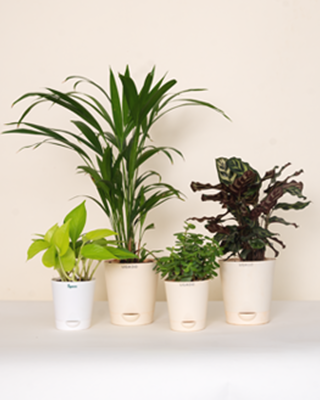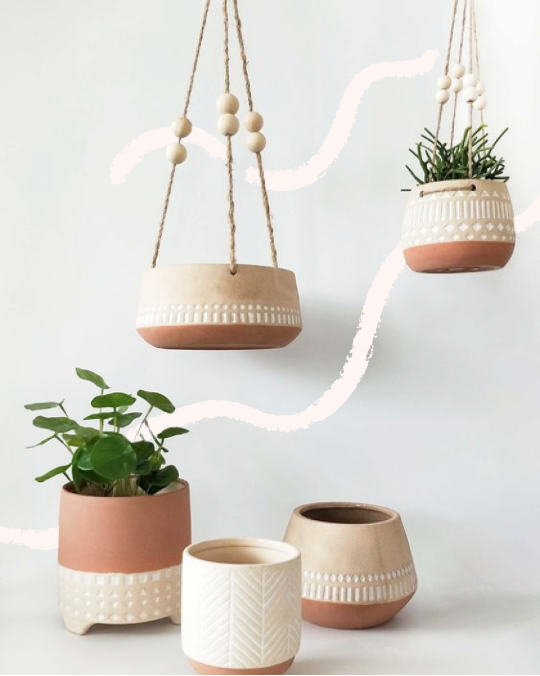Having indoor plants, especially in an office setting, can bring a breath of fresh air and enhance the ambiance. Not only do they add a touch of greenery to your workspace, but they also promote a healthier and more productive environment. However, to ensure that your indoor office plants stay lush and vibrant, proper care is essential. In this blog, we will explore valuable tips and techniques for taking care of your office plants, be it potted plants, desk plants, or pot plants indoor. Whether you are in India or anywhere else in the world, these guidelines will help you keep your indoor plants thriving.
1. Choose the Right Plants:
Before we dive into care tips, it's crucial to choose the right indoor plants for your office. Consider factors like the office's lighting conditions, temperature, and the amount of care you can provide. Some popular indoor plants suitable for office environments include pothos, snake plant, peace lily, spider plant, and ZZ plant. These plants are known for their adaptability and ability to thrive even in low-light conditions.
2. Provide Adequate Lighting:
Indoor plants require sufficient light for photosynthesis, but not all plants have the same lighting needs. Place low-light plants away from direct sunlight, as too much sun can lead to scorched leaves. On the other hand, high-light plants should be positioned near windows where they can receive bright, indirect light. If natural light is limited, consider using artificial grow lights to supplement the lighting requirements of your indoor office plants.
3. Water Wisely:
Proper watering is vital for the health of your potted plants. Overwatering can lead to root rot, while underwatering can cause the plants to wither. Each plant has its own water requirements, so it's essential to research the specific needs of your indoor plants. Check the soil regularly and water only when the top inch feels dry for most indoor plants. However, some moisture-loving plants might prefer slightly damp soil.
4. Choose the Right Pot and Soil:
Selecting the right pot and soil can make a significant difference in your indoor plant's growth. Ensure that your pots have drainage holes to prevent waterlogging. Well-draining soil is essential to avoid excess moisture retention, which can be harmful to the roots. You can use a mix of potting soil, perlite, and vermicompost for most indoor plants.
5. Maintain Humidity:
Indoor environments, especially air-conditioned offices, tend to have low humidity levels, which may not be ideal for some plants. To increase humidity, you can mist your plants regularly or place a tray of water near them. Grouping plants together can also create a microclimate with higher humidity levels.
6. Pruning and Grooming:
Regular pruning and grooming can keep your office plants looking neat and healthy. Trim off yellow or dead leaves to redirect the plant's energy to new growth. Grooming also involves removing dust from the leaves, which can hinder photosynthesis. Wipe the leaves gently with a damp cloth to keep them clean and dust-free.
7. Fertilize Occasionally:
Indoor plants generally require less fertilizer than outdoor ones. Over-fertilizing can lead to nutrient imbalances and negatively impact the plants. Use a balanced liquid fertilizer and apply it sparingly, following the manufacturer's instructions. Usually, fertilizing once every two to four weeks during the growing season (spring and summer) is sufficient.
8. Monitor for Pests:
Keep a close eye on your office plants for any signs of pests such as aphids, mealybugs, or spider mites. Infestations can spread quickly and harm your plants. If you notice any pests, isolate the affected plant and treat it with an appropriate natural or chemical remedy.

Taking care of indoor office plants doesn't have to be complicated. By following these essential tips, you can create a thriving green space in your workplace. Remember to choose the right plants for your office, provide adequate lighting and water, and groom and fertilize them occasionally. Your indoor plants will not only brighten up your office space but also contribute to a healthier and more productive work environment. So, get started and transform your office into a lush and inviting oasis with these plant care techniques!
Read More-
Office Plants and the Science Behind It
Why you should keep plants on your office desk














